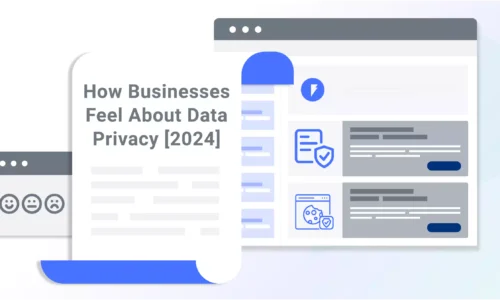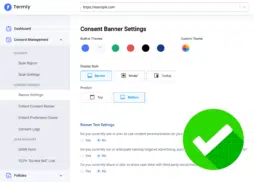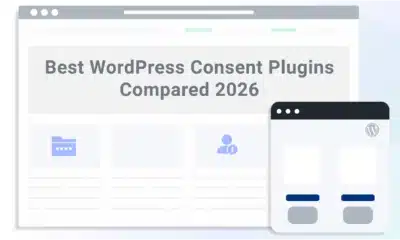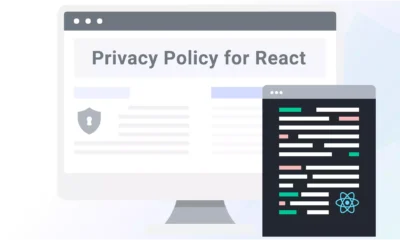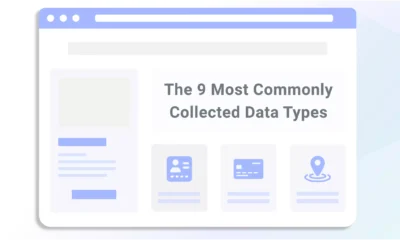We recently surveyed over 1000 small- to medium-sized businesses that use Termly to gauge their experience with data privacy compliance and learn how it impacts them.
With a massive increase in new comprehensive consumer data privacy laws and regulations, we wanted to answer a simple question.
How do businesses feel about data privacy requirements?
How We Conducted Our Survey: Methodology and Disclaimers
We conducted our online survey by emailing a link to Termly users, asking them to provide anonymous responses to questions about data privacy and its impact on businesses.
The survey ran from Jan 2024 to Feb 2024, and the results represent the sample of 1037 users who chose to participate.
The respondents come from 92 different regions around the world and are all 18 or older. The businesses come from 28 different industries and are made up of:
- 50.3% Digital businesses (mobile app, SaaS, blogs, etc.)
- 30.1% Service provider (lawyer, accountant, hair stylist, etc.)
- 28.7% Ecommerce store (Shopify, Etsy, etc.)
- 11.3% in-person location (retail, restaurant, gym, pet store, etc.)
We make no claims that these survey results or our analysis represent any broader audiences of businesses or business owners. None of the data is weighted.
Now, let’s dive into our findings!
We began by asking businesses to describe data privacy in one word.
The majority of businesses described data privacy as “Necessary”
The word cloud below showcases the most frequently submitted words.
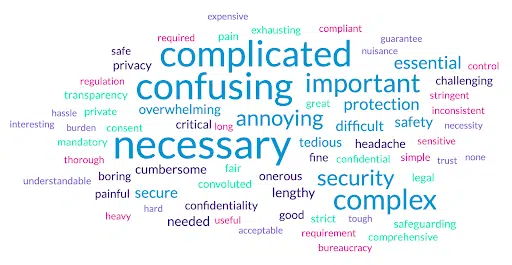
Some of these words we expected, like confusing, complicated, and complex.
Others suggest a feeling of positivity, like secure, important, and comprehensive.
While many respondents described data privacy as confusing or complicated, how do they actually view its impact on their business?
78.1% of businesses felt no negative impact from privacy requirements
Which means only 21.9% said yes to this question, as shown in the chart below.
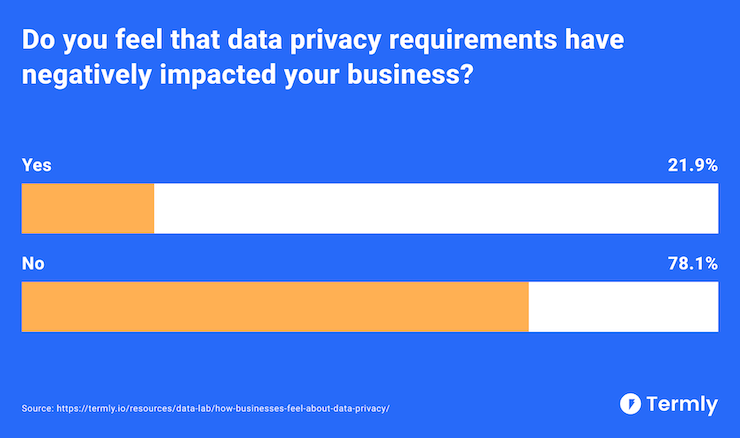
It’s great to know that the majority of businesses haven’t felt negative repercussions from implementing privacy requirements.
Interestingly, our results show that respondents from the U.S. felt the least amount of negative impact from privacy requirements than respondents from the UK and the EU/EEA:
- U.S.: 86.6% do not feel that data privacy requirements negatively impact their business.
- UK: 77.8% do not feel that data privacy requirements negatively impact their business.
- EU/EEA: 67.8% do not feel that data privacy requirements negatively impact their business.
Perhaps this is because not all U.S. state-level privacy laws apply to all U.S. businesses, whereas the EU GDPR and the UK GDPR apply to all entities based in those regions.
With most businesses not reporting a negative impact, our next two results make sense.
91.1.% of businesses are willing to prioritize data privacy if they knew it would increase customer trust and loyalty
A mere 8.9% answered ‘no’ to this question, as shown in the chart below.
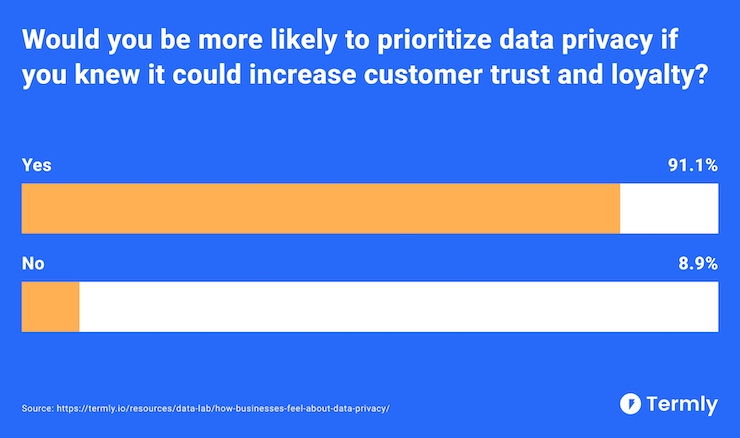
As it turns out, statistical evidence highlights that prioritizing privacy compliance does lead to more consumer trust — the 2021 Global Consumer State of Mind Report found that 60% of users say they would spend more money with a brand they trust to handle their personal data responsibly.
According to research conducted by Tableau, 48% of internet users have stopped shopping with a company over privacy concerns.
Similarly, Cisco’s 2022 Consumer Privacy Survey revealed that 81% of users believe the way a company treats their personal data is indicative of the way it views them as a customer.
Rather than feeling bogged down by these and other statistics highlighting a shift in the consumer mindset, the businesses we surveyed are ready to strike a balance.
The vast majority — 94.1% — of businesses believe you can achieve a balance between data collection for marketing while respecting customer privacy
As the chart below shows, only 5.9% of respondents said ‘no’ to this question.
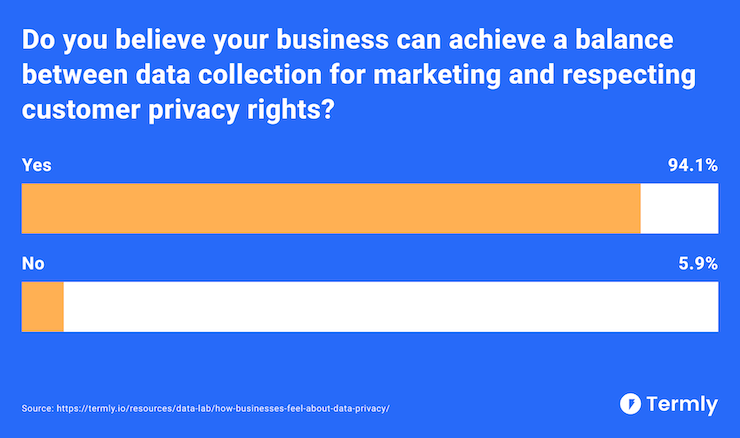
The businesses we surveyed are obviously willing and ready to show consumers they respect their privacy and prioritize protecting their personal data.
We predict these motivations will continue to grow, especially as lawmakers begin proposing legislation to regulate new technologies that rely on personal data, like AI.
Compliance solutions like our Privacy Policy Generator and Consent Management Platform (CMP) can help businesses achieve this balance.
Now that we know businesses are determined to prioritize data privacy, let’s examine why they chose to use Termly solutions in the first place.
When asked why they use a solution like Termly, businesses selected ‘Data privacy law requirements’ more than any other reason
More specifically, this question yielded the following results when presented to survey takers as a list with the option to choose more than one answer:
- Data privacy law requirements — 72.9%
- Third-party service privacy requirements — 44.5%
- Fear of legal penalties — 38%
- Fear of reputational loss — 20.4%
- Fear of losing customers — 15.6%
- Other — 6.8%
See more details in the chart below.
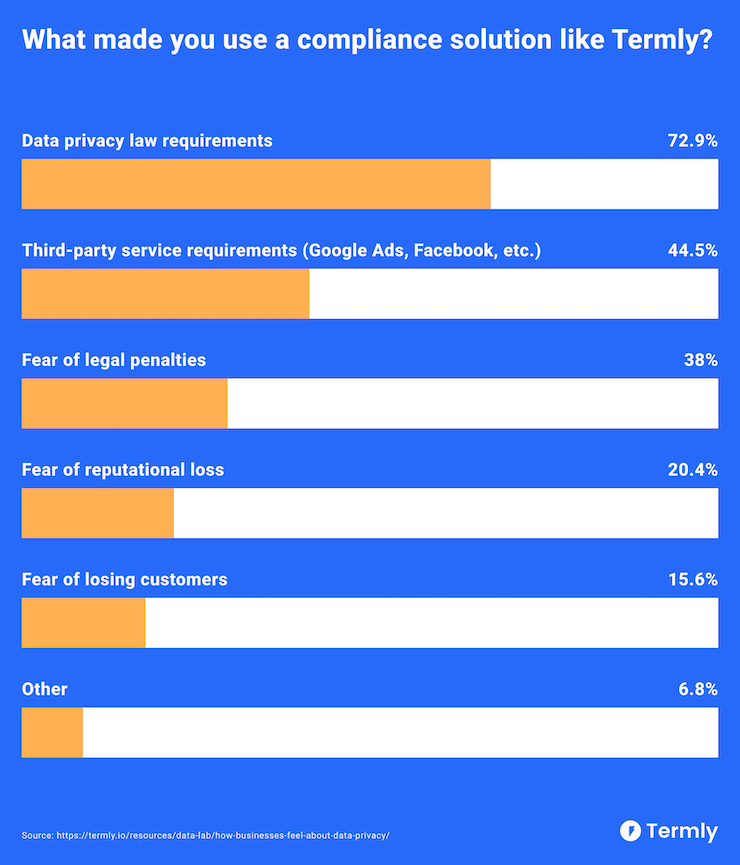
These results don’t surprise us — Termly’s compliance solutions are designed to help businesses simplify the following aspects of privacy compliance required by different laws:
- Privacy notification: These laws require entities to present consumers with a reasonable, clear privacy policy that includes specific information and clauses.
- Consent management: Many laws also outline consent requirements businesses must follow and obtain for different types of data collection, processing, and use.
Our Privacy Policy Generator even includes all necessary information required by 11 different current and upcoming U.S. state-level privacy laws.
Its comprehensive legal coverage is likely the reason why so many survey takers said they created a privacy policy using Termly’s generator.
89.6% of businesses who took our survey said they have a privacy policy
View the entire breakdown of policies these businesses reported having in the chart below.
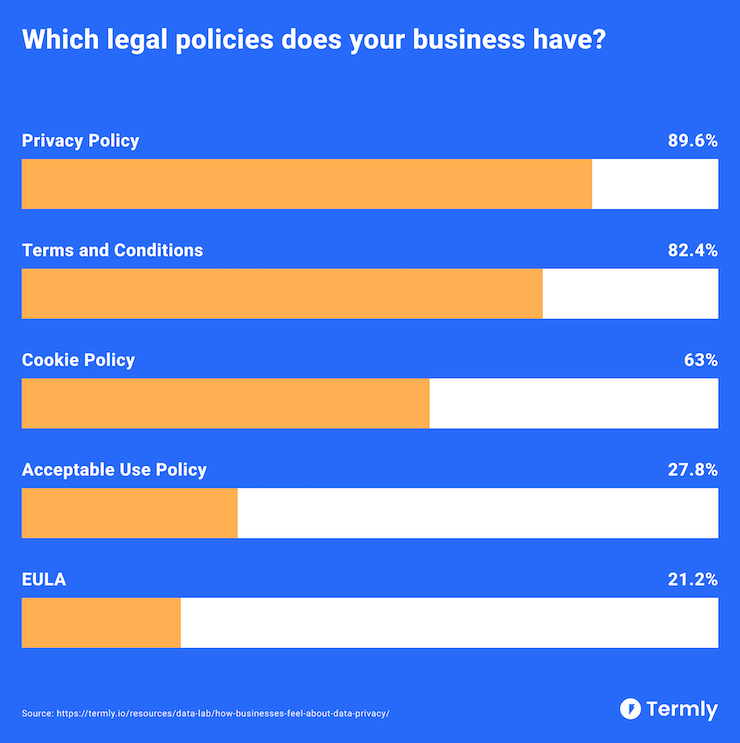
Our terms and conditions generator is the second most popular policy used by our survey takers (82.4%). While these aren’t necessarily legally required, they’re a best practice to have as they protect your business by informing users about what to expect from you and what you expect from them.
The third most popular legal policy generated by survey takers is a cookie policy (63%), and like privacy policies, their information is affected by different privacy laws.
Businesses must present users with an up-to-date and accurate cookie policy because non-essential internet cookies collect personal information from website visitors. This policy helps keep users properly informed about all types of data a site collects from them.
But cookie policies are also essential for complying with the consent requirements outlined by several privacy laws.
Now, let’s look at consent management
Pop-up cookie banners with a live link to an accurate cookie policy help businesses comply with the consent requirements outlined by different privacy laws.
But it’s been questioned whether posting one on a website deters consumers or negatively affects businesses.
We wanted to hear how true this might be from the businesses themselves, so we asked respondents who use a consent banner if they’ve ever noticed any adverse effects.
When asked what impact cookie consent banners had on their business, 89.2% said it had a positive or no noticeable impact
In total, only 10.9% of survey takers said a cookie consent banner had a ‘negative’ impact on their business, as shown in the chart below.
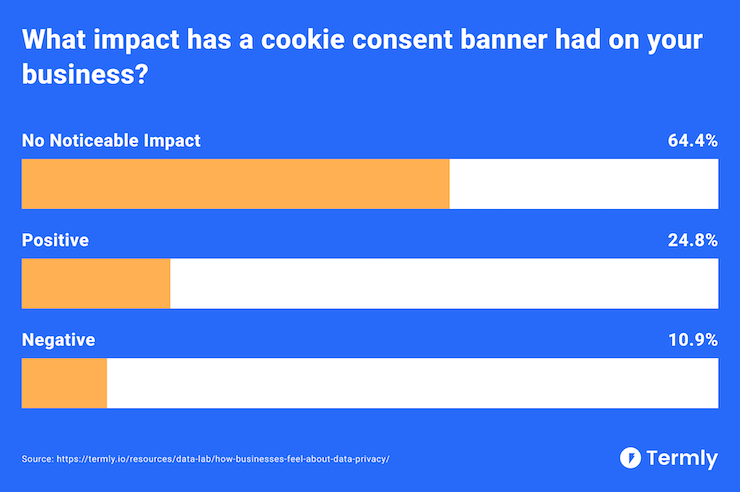
These results imply that the assumption that cookie banners hurt websites is false.
Using a reputable cookie consent manager might even help some websites, especially considering that nearly a quarter of survey takers responded that their banner positively impacted their business.
So, how do businesses feel about data privacy requirements?
Our survey results made one thing clear: businesses have a relatively positive outlook regarding data privacy and its potential impacts on them.
Most of our survey respondents felt that achieving a balance between their business needs and consumers’ privacy rights is possible, and they’re willing to focus on this to foster loyalty and trust with their customers.
We agree — and to help you achieve this balance, we’ll continue to develop and offer more effortless, affordable data privacy compliance solutions.
This includes updating features like our CMP and Privacy Policy Generator to meet the standards of new or evolving privacy laws.

